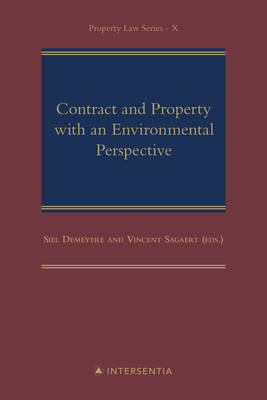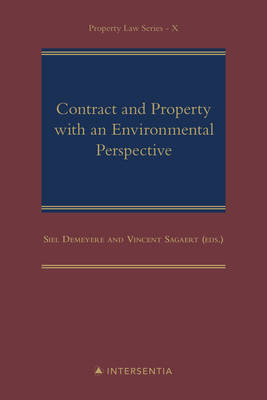
- Afhalen na 1 uur in een winkel met voorraad
- Gratis thuislevering in België vanaf € 30
- Ruim aanbod met 7 miljoen producten
- Afhalen na 1 uur in een winkel met voorraad
- Gratis thuislevering in België vanaf € 30
- Ruim aanbod met 7 miljoen producten
Zoeken
€ 87,95
+ 175 punten
Omschrijving
This book includes the conference proceedings of a conference in September 2019. The Institute for Property Law of the University of Leuven had the opportunity to welcome numerous authoritative legal scholars to debate on the impact of sustainability challenges on the crossroads between contract and property. While environmental issues, and more broadly sustainability, are often conceived as a matter of public law, if a matter of law at all, in recent years, also private law aims to join in. More fundamentally, environmental law could challenge the main division in private law, the division between contract and property. Fundamental rules of traditional private law, with strong historical roots, such as the privity of contracts, the closed system of property rights, the praedial rule with regard to servitudes, etc. are under pressure. The contributions of this book therefore are situated at the point of encounter of at least three fields of law: environment, contract and property. Very often, a fourth field of law joins this encounter: the constitutional protection of ownership plays a major role in the described challenges. The contributions in this book are on the one hand, careful analyses of national laws, and on the other hand, more general views on the interplay between property law and sustainability.
Specificaties
Betrokkenen
- Auteur(s):
- Uitgeverij:
Inhoud
- Aantal bladzijden:
- 286
- Taal:
- Engels
- Reeks:
Eigenschappen
- Productcode (EAN):
- 9781780688657
- Verschijningsdatum:
- 17/07/2020
- Uitvoering:
- Hardcover
- Formaat:
- Genaaid
- Afmetingen:
- 160 mm x 240 mm
- Gewicht:
- 648 g

Alleen bij Standaard Boekhandel
+ 175 punten op je klantenkaart van Standaard Boekhandel
Beoordelingen
We publiceren alleen reviews die voldoen aan de voorwaarden voor reviews. Bekijk onze voorwaarden voor reviews.











